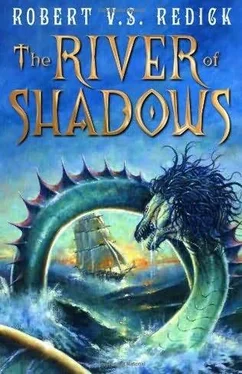Robert Redick - The River of Shadows
Здесь есть возможность читать онлайн «Robert Redick - The River of Shadows» весь текст электронной книги совершенно бесплатно (целиком полную версию без сокращений). В некоторых случаях можно слушать аудио, скачать через торрент в формате fb2 и присутствует краткое содержание. Жанр: Фэнтези, на английском языке. Описание произведения, (предисловие) а так же отзывы посетителей доступны на портале библиотеки ЛибКат.
- Название:The River of Shadows
- Автор:
- Жанр:
- Год:неизвестен
- ISBN:нет данных
- Рейтинг книги:4 / 5. Голосов: 1
-
Избранное:Добавить в избранное
- Отзывы:
-
Ваша оценка:
- 80
- 1
- 2
- 3
- 4
- 5
The River of Shadows: краткое содержание, описание и аннотация
Предлагаем к чтению аннотацию, описание, краткое содержание или предисловие (зависит от того, что написал сам автор книги «The River of Shadows»). Если вы не нашли необходимую информацию о книге — напишите в комментариях, мы постараемся отыскать её.
The River of Shadows — читать онлайн бесплатно полную книгу (весь текст) целиком
Ниже представлен текст книги, разбитый по страницам. Система сохранения места последней прочитанной страницы, позволяет с удобством читать онлайн бесплатно книгу «The River of Shadows», без необходимости каждый раз заново искать на чём Вы остановились. Поставьте закладку, и сможете в любой момент перейти на страницу, на которой закончили чтение.
Интервал:
Закладка:
Then he saw a dark streak below the surface. It was a dlomu, shooting toward him. A moment later Ibjen rose, treading water in a frenzy.
“This water’s unnatural!” he cried. “Even I can barely swim!”
“The vine’s going to break,” Pazel shouted.
Ibjen turned in place, splashing desperately to hold still. “We’ll swim back together,” he said.
Pazel shook his head. “I’m not strong enough. I’ll have to go around the tower, downstream.”
But there was no more hope in that idea than in Ibjen’s. Even if he managed to keep his head above water, the river would simply peel him away from the wall once he rounded the curve.
“You can still make it,” he shouted to Ibjen. “Go on! Take care of Neeps and Thasha!”
Ibjen was staring at him strangely. “I failed the prince,” he said, just audible over the water’s roar.
“Ibjen, the vine-”
“I broke my oath to him. And to my mother. I’m paying now, like Vadu did.”
Ibjen’s eyes, like those of the woman in Vasparhaven, were jet-black. In nuhzat again. Was he aware of things around him, or in a different world altogether?
“Pazel,” he shouted suddenly, “you’re going to have to climb that wall.”
“Climb? You’re mad! Sorry, I-”
The vine snapped like a shoelace. Pazel clawed at the stone, but already the current was whirling him on. He felt Ibjen seize him by the shoulders. “Down, then,” gasped the boy. “Hold your breath. Are you ready?”
Before Pazel could say No! the boy pushed him under. Kicking hard, he drove them both down the side of the wall. Descent was swift and easy; it was staying up that had been close to impossible. But with every inch they dropped there was less water, more black air, and now Pazel could feel the roaring cyclone, tearing along the side of the tower. It would lift them, bear them away like leaves. But Ibjen fought on, kicking with astonishing determination and strength, clawing at the water with his free arm, down and down.
And suddenly Pazel saw his goal. The river had undercut the tower’s foundation; two or three of the mammoth stones had been torn completely away, and dim moonlight shone through the gap. It was a way through the wall, into the center of the ruin.
But they would never make it. They were sliding past the gap already, and now the River of Shadows had replaced the Ansyndra almost entirely: the water felt as thin as spray. Beneath his feet, Pazel caught another glimpse of that vast windy cavern, winding away into eternity. There were walls, doors, windows. Lights in some of them. He saw a mountainscape at sunset; he saw two children with their noses pressed to glass, watching their struggle. He saw himself and Ibjen vanishing into that maelstrom, forever.
Then, from somewhere, Ibjen found even greater strength. His limbs were a blur; his teeth were gritted, and with another blast of clarity Pazel found some last reserve of his own strength. For two or three yards, no more, they managed to move upstream. And just when Pazel knew that he could go no farther, Ibjen shoved him bodily into the gap.
Pazel clung to the stone, found purchase, dragged himself forward. The wind fought him terribly, wild surges of air tried to pull him back into the river. Howling inside, limbs straining beyond any effort in his life, he gained another inch, another foot, then turned and reached for Ibjen The dlomic boy was a speck, whirling away down the tunnel. A black leaf, a shade in a river of shades-dwindling, dissolving, gone.
“Hercol,” said Ramachni, “can you leap over the pit?”
Thasha was aghast at the strain in his voice. The two mages were fighting to the death, and Arunis, it seemed, was the stronger. The edge of the pit was now just inches from their toes.
“Not that far, Master,” answered Hercol.
“Never mind, then, I will-”
Ramachni broke off, and his eyes opened. Then Thasha heard it: a whirling, whistling sound. Five feet above their heads, blades had appeared: long, heavy scimitar-blades, parallel to the ground, spinning at unholy speed. Thasha could not count them: maybe a dozen, maybe more. Everyone crouched down, horrified. To reach for one of those blades would be to lose a hand. And now, as she had known that they would, the blades began to descend.
“Well,” said Ramachni, “he has certainly mastered the Stone.”
His limbs were rigid, and his small body shook, and Thasha knew that he was trying to arrest both the blades and the advance of the pit. And yet the blades were still lowering, very gradually. “You had best get to your knees,” said Ramachni.
They got to their knees, but the blades kept coming. They were almost invisible with speed, and through them Thasha saw Arunis gesturing at something beneath his feet, and then “Look out!”
Several large fragments of the staircase were moving toward them. Not quickly, not with aim or force; it was as if Arunis had reached the limits of the horrors he could control at once. The first stone dropped motionless before it had traveled halfway; two others fell and slid along the ground, toppling at last into the pit. Then a larger fragment rose, wobbling, teetering, like a stage magician’s clumsy prop. Above, they heard Arunis groan with effort.
The stone flew at them-flew directly at her, Thasha realized. She raised her arms-but there was Hercol, pushing in front of her, absorbing the blow. The chunk of stone must have weighed more than he did, and it struck him dead-on. The top edge nicked one of the whirling blades; fragments of stone and steel flew among them; there were cries and sick sounds of impact. And before they knew what harm had come to whom, the blades dropped lower still.
Hercol was unconscious, the stone upon his arm, Ildraquin loose in his hand. Lunja was bleeding from her mouth. Earth crumbled into the pit, a little here, a little there. Among the crouched and bleeding bodies Thasha could no longer see Ramachni. But then she heard his voice in her mind.
I cannot stop him, Mistress. If you would help me, do it now.
Mistress? Help him? What could she do? He was mistaken; Arunis had fooled him like he had fooled everyone else at one point or another. She was not Erithusme and never had been. She was a mortal girl in a trap. Weepy, weak, besotted with a boy who might already be dead, caught up in a fight that was never her own. Why had they lavished their love on her, their efforts, their belief? She heard the Mother Prohibitor’s voice from her old, detested school, and knew that the ancient woman had, after all, known her better than she’d known herself. Failure is not an accident. Not a thug who grabs you in an alley. It is an assignation in a darkened house. It is a choice.
They were all pressed flat. Thasha suddenly found Neda gripping her hand, saw that she and Cayer Vispek had reached for others as well. They were praying, praying in Mzithrini. Why hadn’t she studied the language harder? Pazel would laugh. It was a farewell, wasn’t it? Something about knowledge in the last hour, peace when the fight was done.
Some of them had been cut; a mist of blood haloed the blades. Neda turned her head to Thasha. “I am glad to die with you, warrior,” she said. “I am glad you loved him, while you could.”
Something in Neda’s voice changed Thasha forever. There was no sign of daybreak, yet she was flooded with light, with certainty. She knew who she was, and who she had been; and she knew that Arunis had been right to fear her. She could have swept him away like dust from her hands. She could have seized the Stone before he lifted a finger, pounded his body a mile into the earth, hurled him into the clouds and let him fall. She could feel the edges of that power, almost taste it on her tongue. It had slumbered inside her, untapped for years, laid away like firewood against the winter, this winter, this moment of need.
Читать дальшеИнтервал:
Закладка:
Похожие книги на «The River of Shadows»
Представляем Вашему вниманию похожие книги на «The River of Shadows» списком для выбора. Мы отобрали схожую по названию и смыслу литературу в надежде предоставить читателям больше вариантов отыскать новые, интересные, ещё непрочитанные произведения.
Обсуждение, отзывы о книге «The River of Shadows» и просто собственные мнения читателей. Оставьте ваши комментарии, напишите, что Вы думаете о произведении, его смысле или главных героях. Укажите что конкретно понравилось, а что нет, и почему Вы так считаете.












